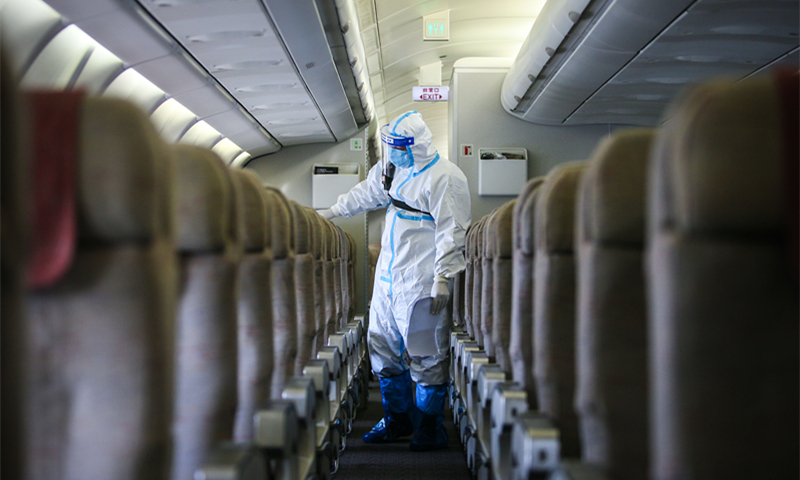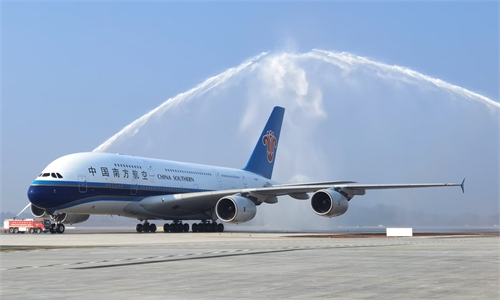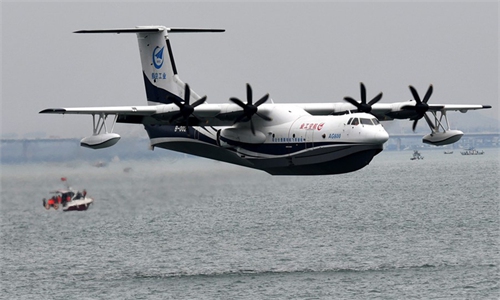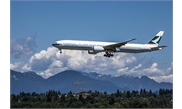
A staffer conducts cabin inspection in Qingdao, East China's Shandong Province on March 5, 2021. Photo: VCG
Since the outbreak of the COVID-19 epidemic, major airlines around the world have adjusted their operating models on a large scale. In recent days, many airlines announced new arrangements for their large wide-body passenger aircraft.
China Southern Airlines, owner of five A380 superjumbos in China, said on Tuesday that it has used A380 passenger aircraft to carry cargos for the first time. The first of the "passenger-to-cargo" flights loaded with more than 20 tons of cargo arrived in Sydney, Australia from Guangzhou, South China's Guangdong Province.
A picture shared by China Southern showed that the goods are laid at the aisle besides the seats in the plane.
Such arrangement comes as demand for cargo business has been rising, as cargo has outperformed the passenger business throughout the pandemic. However, the fate of the wide-body aircraft remains uncertain for the carriers going forward.
Commenting on the role of wide-body aircraft, Ma Xulun, chairman of China Southern said on April 22 that due to the impact of the epidemic, the demand on international routes has dropped significantly. Currently, the daily utilization rate of wide-body aircraft is low, and the A380 is also facing problems such as production suspension and high operating costs.
Ma said that China Southern will conduct research over the introduction and exit plan of wide-body aircraft based on market demand, utilize flying routes and steadily improve fleet effectiveness.
Additionally, Malaysia Aviation Group (MAG), Malaysia Airlines' parent company, has indicated plans to retire its Airbus A380 fleet "in the coming months," according to industry news outlet flightglobal.com on May 4.
"We're currently exploring ways of disposing the aircraft. We're cognizant of the challenges of how to sell the aircraft [which is one possibility] but we're exploring ways," MAG CEO Izham Ismail said during a media briefing.
Currently, Malaysia Airlines has six A380 jets in its fleet and these are currently in storage.
Malaysia Airlines' A380s were put into operation on July 1, 2012. The first route was the Kuala Lumpur-London route. Malaysia Airlines was the eighth airline to operate A380 globally.
The collapse of international air travel during the pandemic had looked set to hasten the end of the A380 as airlines switch to smaller planes. Bloomberg reported in April that Deutsche Lufthansa AG has warned that its A380s may never fly again and Air France-KLM said last year it would phase out its fleet early.
Airbus decided in 2019 to stop production of the world's largest jetliner after the plane's biggest customer, Dubai-based Emirates Airline, cut its order by 39 planes.
Airbus has "no basis to sustain production, despite all our sales efforts with other airlines in recent years," CEO Tom Enders said in a statement, adding such announcement is painful. Airbus said the final A380 will be delivered to Emirates in 2021.
The A380 project was launched in 2001, delivered in 2006, and closed in 2021, meaning that it was nearing completion only 15 years after its first flight.
So far, there are only five A380 aircraft have been purchased by Chinese carriers, all operated by China Southern Airlines.
Falling demand
Since March 2020, major airlines around the world have been adjusting their operating models on a large scale. The reforms are aimed at older models and large wide-body aircraft.
In terms of unit cost of passenger aircraft operations in the epidemic era, wide-body aircraft is also the least cost-effective. Airlines must set aside separate "safe seat spaces" for passengers, which makes the seats available for passenger aircraft only account for about 60 percent of the total number of seats.
Market watchers said internal travel restrictions are also the major reason behind.
The International Air Transport Association (IATA) said on April 22 that it expects net losses of $47.7 billion for the airline industry in 2021. This is an improvement from previously estimated net industry loss of $126.4 billion in 2020.
But Willie Walsh, IATA's Director General said that this pandemic is longer and deeper than anyone could have expected. Losses will be reduced from 2020, but the pain of the crisis increases.
Although there is optimism in domestic markets where aviation's hallmark resilience is demonstrated by rebounds in travels without internal restrictions, government-imposed travel restrictions, however, continue to dampen the strong underlying demand for international travel. Though 2.4 billion people are estimated to travel by air in 2021, airlines will burn through a further $81 billion in cash, he added.
Reuters reported on Tuesday that Airbus is asking key suppliers to get ready for a further 18 percent increase in A320-family jet output by the end of 2022, on top of existing targets for this year, as airlines eye a partial return to normal travel.
The tentative goal would lift output of the workhorse domestic and medium-haul jet, which competes with Boeing's 737 MAX, to 53 a month, industry sources told Reuters.
Market watchers predicted that C919, China's domestically-developed single-aisle passenger aircraft, a rival for Boeing 737 and the Airbus' A320, has greater opportunities in such race.
The plane has successfully conducted cold-weather test flights in Hulun Buir, North China's Inner Mongolia Autonomous Region in January.
C919, China's first self-developed trunk jetliner, has 158-174 seats and a range of 4,075-5,555 km. The plane rolled off the production line in 2015 and completed its successful maiden flight in 2017.
The aircraft is expected to receive an airworthiness certificate issued by the aviation authority and will be put into service this year.



